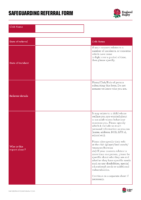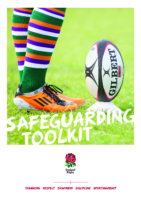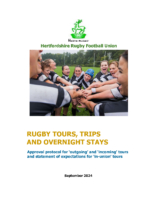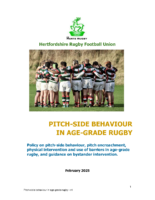Safeguarding is everyone’s responsibility.
Safeguarding Children
Safeguarding is a broad term that includes both the response to incidents of concern about children as well as the responsibility to promote their welfare.
All players under the age of 18 are children (section 31 Children Act 1989) and should be respected as such. All children’s rugby (age-grade rugby) in Hertfordshire complies with England Rugby’s (RFU), with ‘Regulation 15’, ‘Regulation 21’ and with the ‘Safeguarding Children Policy’.
These regulations and this policy set out the key principles for safeguarding. They provide guidance on what best practice looks like and on what constitutes poor practice. It is essential for all those involved in creating safe environments in rugby, whether as a parent, coach, spectator or club official that these are adhered to.
Hertfordshire RFU want every child’s experience of rugby to be positive. Children’s welfare should be promoted above all else, so they are enabled to get the best outcomes from the game. Above all, age-grade rugby activity, including coaching approaches, should be;
Player Centred, Development Driven and Competition Supported
Safeguarding Adults
Safeguarding approaches also apply to those adults within the game who may have additional, often hidden factors that may make them more prone to the risk of harm. This might include mental ill-health or a physical or learning disability. More information on safeguarding adults is set out in the RFU ‘Safeguarding Adults’ pages.
Safeguarding in the County
Hertfordshire RFU has a Constituent body Safeguarding Manager (CBSM). The CBSM is responsible for overseeing all safeguarding activity by the clubs in the county. The CBSM also supports clubs with advice and guidance on all safeguarding matters and supports clubs to ensure their volunteer workforce and their environment are safe.
Safeguarding in Clubs
Every rugby club in Hertfordshire should have a Club Safeguarding Officer (CSO). The responsibility of the CSO is to monitor practice at the club, and to refer any concerns about children (or adults at risk) to the CBSM and / or the RFU.
The CSO should also ensure that volunteers are recruited using the ‘safer recruitment’ principles. To that end, applicants for volunteer roles in rugby (such as coaches, first aiders and anyone who has regular contact with children) should be directed to complete a ‘volunteer application and self-declaration form’ to begin the safer recruitment process.
This process also includes a check with the Disclosure and Barring Service (DBS), which the CSO facilitates, and completion of the RFU ‘Introduction to Safeguarding’ short online course. Note that DBS checks cannot be commenced until the online safeguarding course has been completed.
Further information about applying for and managing DBS checks can be found here (for applicants) and here (for CSOs).
The CSO is also responsible for completing an online safeguarding self-audit at the beginning of each season through the RFU’s ‘Game Management System’. The purpose of this is to demonstrate that the club is doing its best to provide a safe and enjoyable rugby experience for all children who are training and playing at the club.
The CSO is also responsible for checking that all rugby tours (see below) are planned properly and undertaken safely.
Personal Safeguarding Responsibilities
In order to provide children with the best possible experiences and opportunities in rugby union, it is imperative that everyone operates within the above frameworks. They must demonstrate, and model exemplary behaviour. Every volunteer working with children should consistently work to, and promote the Core Values of Rugby, which are:
- Teamwork
- Respect
- Enjoyment
- Discipline
- Sportsmanship
Everyone involved in the game should promote good practice in others, by challenging and reporting poor behaviour whenever it is witnessed.
Be an active bystander
Reporting Concerns
Allegations of abuse or poor practice must be reported to the RFU through the CSO and / or the CBSM where possible. It is important when reporting a concern that the RFU are informed as soon as possible so they can provide direction and effectively support clubs with advice on the management of risk.
Thinking of going on an age-grade rugby tour?
The RFU has produced the ‘Trips, tours and overnight stays’ guidance on planning and undertaking rugby tours. These must be followed for all age grade rugby tours. The RFU ‘Tour resources and forms’ are also useful to support your tour planning.
If you are planning to go on a tour outside of the England Rugby Union Area, or is you are inviting a touring side from outside the Union, you must apply for permission through the CBSM (through the CB secretary for adult tours). This is done by using the Herts RFU’s Tour approval protocol and the relevant application forms for outgoing and incoming turs. There are also some additional tour resources available that may help you to plan and undertake a rugby tour.
Need more help? Watch Tour Planning and Risk Assessment Workshop.








